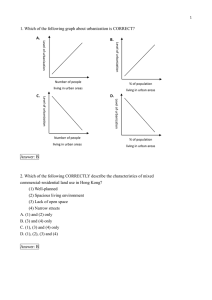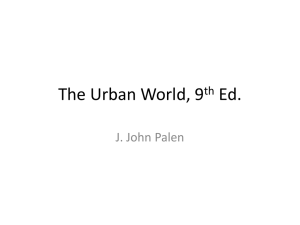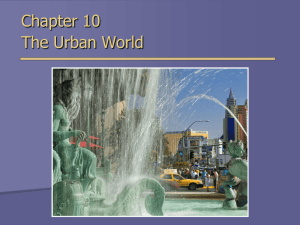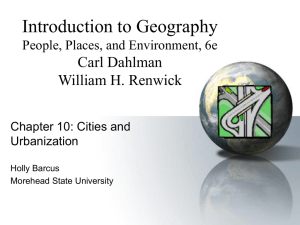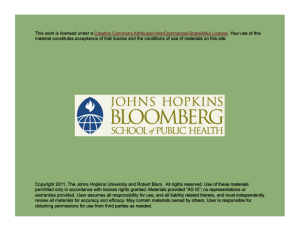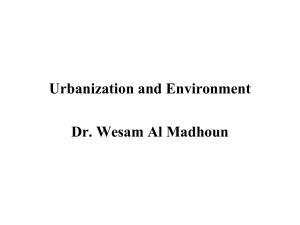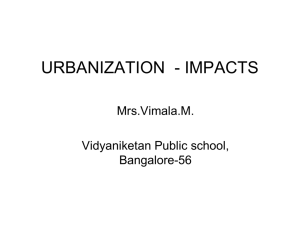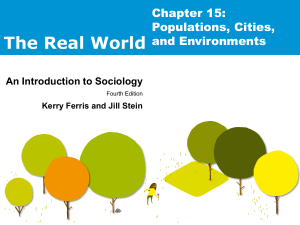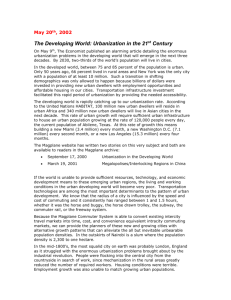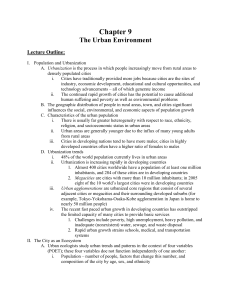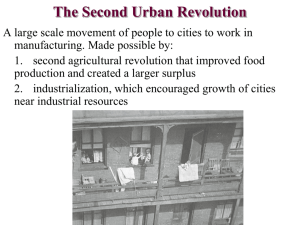城市數目由1978年的192個發展到2000年的668個
advertisement
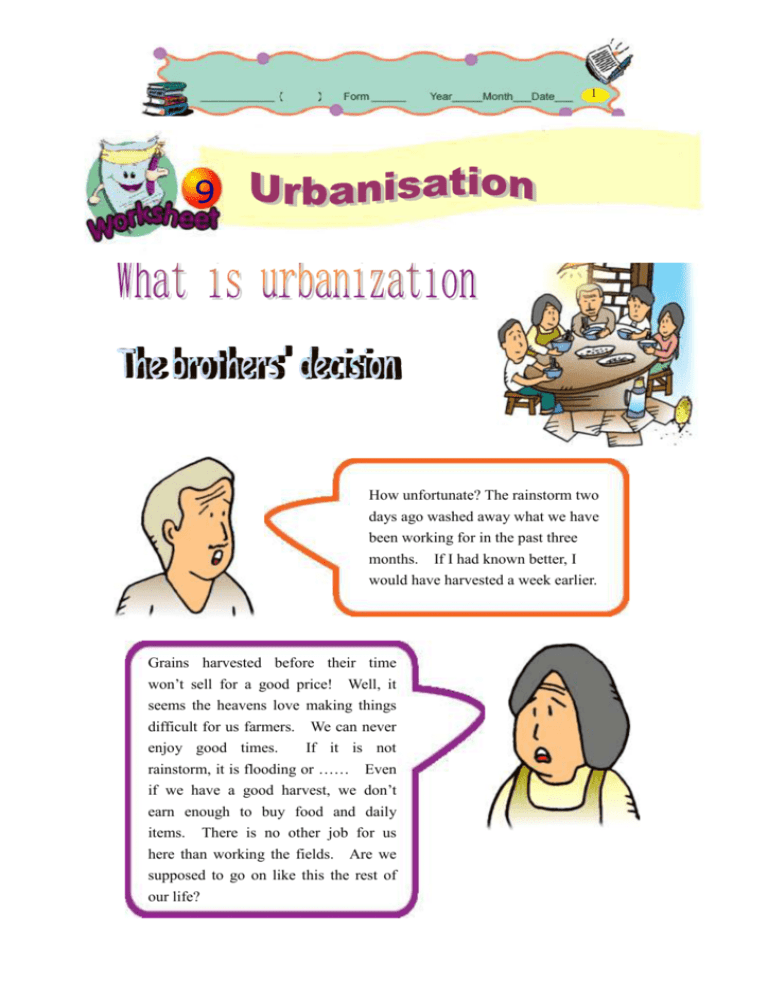
1 9 How unfortunate? The rainstorm two days ago washed away what we have been working for in the past three months. If I had known better, I would have harvested a week earlier. Grains harvested before their time won’t sell for a good price! Well, it seems the heavens love making things difficult for us farmers. We can never enjoy good times. If it is not rainstorm, it is flooding or …… Even if we have a good harvest, we don’t earn enough to buy food and daily items. There is no other job for us here than working the fields. Are we supposed to go on like this the rest of our life? 2 Pa, Ma, I was going to tell you that younger brother and I plan to go to the city after the New Year to try our luck. We’ll see if we can find work there. However, we are somewhat worried about you not having help in the fields. Big brother, that’s all right. 4th younger sister and I will help out! In any case, we won’t have the opportunity to go on to middle school after finishing primary. Don’t get me wrong, I like going to school. The teacher says I do well in school and can continue with my studies. If only there is a middle school in the village …! To tell you the truth, I wouldn’t want to leave you behind and go to a strange place all by myself. But then, life in a farming village is difficult and we have to brave the sun and rain out there in the fields. If one is ill, it takes more than two hours of walking to receive medical attention at a hospital. Ah Keung of the neighbouring village says wages in the city are much higher. Workers there enjoy holidays and go to the cinema in their free time … So I plan to go with eldest brother. 3 It’s a good idea to try your luck beyond. This way, we won’t be looked down upon as bumpkins or good-for-nothings. But then when can we see each other again …? There are many bad men in the city. I am worried! …… If you were the mother, would you let the brothers go to the city to look for jobs? Why? 4 The following are pictures sent home by the brothers. They represent the brothers’ impression of city life. 5 Look at the pictures and analyse the pros and cons of city life. Pros Cons 6 1. Urban migration --- rural people moving to towns 2. Urban migration is the result of the push factor of too many unfavourable rural living conditions and the pull factor of attractive urban opportunities. Level of urbanization –percentage of urban population Urban population Level of urbanization= X 100% Overall population 3. 4. Urbanization –the process of increase in the percentage of the urban population and of decrease in the percentage of the rural population. 5. The increase in the rate of urbanized population is mainly due to migration and secondarily the natural growth of the urban population (i.e. birth rate minus death rate). 城市人口百分比 Percentage of urban population 7 80 70 60 50 40 30 20 10 0 世界 World 發達國家 Developed Countries 欠發達國家 Underdeveloped countries 2000年世界城市化水平 Level of world urban population in 2000 1. Read Source 1 carefully. What is the difference between the level of urbanization in developed countries and that in developing countries? Why is there such a difference? 8 According to the Fifth National Population Census, 455.94 million people or 36.09% of the population live in townships and 807.39 million people or 63.91% live in rural areas. Compared to the general census in 1990, the growth rate of the urban population is 9.86%. Translated from: National Bureau of Statistics of China. <www.stats.gov.cn> 2. Draw a bar chart based on the data of the variation of urban and rural population given in Source 2 (use of Excel is permitted) 9 3. Judging from the above data concerning urbanization, how should we categorize China? Why Chinese cities have developed rapidly since the years of reform and opening up. The number of cities has risen from 192 in 1978 to 668 in 2000. The role of cities in the national economy is becoming more and more important. In 2000, cities took up 68.63% of the national GDP. At present, there are 51 big cities in China and among them, 14 are ultra-large cities. There are 210 medium-sized cities, representing 31% of the national total. Medium-sized cities usually refer to provincial cities and townships with a population of about half to one million. There is a large number of such cities. They are widely dispersed and their total economic share is above 30% of the national GDP. 10 4. a. Take reference from the following website about urbanization in China Identify on the map of China below large cities (A to D) with a population of over 3 million. A. Tianjin b. B. Chongqing, C. Chengdu, D. Wuhan Look for 5 other large cities with a population over 300 million and mark them out on the map. 11 1. What is the relationship between urban development and economic development? China Population Information and Research Center 中國城市化網站 12 Basic information about cities (part) --- city population (1981-1998) (10,000’s) Population 1981 1985 1990 1994 1996 1997 1998 Beijing 542.7 586.4 624.2 649.6 662.79 670.04 675.26 Tianjin 500 538.1 572.6 587.3 590.9 591.56 594.9 129.3 138.5 148.4 156.7 176.38 162.84 163.64 Taiyuan 214 188.2 194.7 208 217 221.7 223.3 Huhhot 79 79.2 88.6 92.8 96.4 98.7 101.7 Shenyang 391.8 420.1 453.9 661.1 384 386.28 387.63 Dalian 145.2 162.9 239.6 252.4 257.2 295.7 262.4 Changchun 169.6 186.5 211 223.7 274.17 278.81 282.69 Jilin 104.9 113.8 127.5 136.8 139.35 140.81 140.93 Harbin 246 262.5 282.7 317.3 329.86 334.72 337.69 Shanghai 1163 698.3 783.5 1298.8 961.02 1018.59 1070.62 Nanjing 208.7 225 249.8 261.5 269.37 273.26 276.36 Wuxi 78.1 84.3 92.8 96.1 108.77 109.56 110.21 Suzhou 65.8 70.9 84.4 105 106.43 107.07 107.75 Hangzhou 115.6 124.7 133.9 141.3 144.96 169.29 171.89 Tangshan 13 Basic information about cities (part) --- city population (1981-1998) (10,000’s) Con’t Population 1981 1985 1990 1994 1996 1997 1998 Ningbo 45.2 102.1 110.6 112.7 116.2 123.5 119.68 Wenzhou 97.1 53.1 56.2 113 114 115.28 116.48 Xiamen 49.2 54.6 60.3 65.5 68.31 81.17 126.59 Jinan 129 143 232.2 243 250.9 250.9 257.49 Qingdao 115.3 125.1 205.8 215 223.86 227.8 229.58 Luoyang 95.1 104.7 119 127.4 135.87 138.52 141.08 Shenzhen 8.5 23.2 39.5 133.2 160.3 175.1 184.63 Wuhan 315.7 339.6 475.1 392.5 415.55 408.86 412.12 Guangzhou 301.7 328.9 356.1 377.4 387.75 395.65 396.04 Zhuhai 13 15.5 22.5 33.1 36.8 38.2 40.74 Shantou 70.9 76.1 85.6 101.5 106 109.22 111.32 106 114.9 123.6 126.8 128.36 130.08 Zhongshan Zhanjiang 84.9 92 106 118.1 124.63 128.38 130.73 Chongqing 259.7 277.9 298.4 309.7 551.36 557.48 836.52 Chengdu 242.7 258.3 280.8 301.5 317.13 321.92 325.98 Kunming 126.2 148.8 153.5 163.3 166.94 169.78 173.06 209 232.8 275.7 292 304.5 309.3 333.5 Lanzhou 138.1 135.3 150.7 161.2 168.96 172.44 174.98 Urumqi 91.8 100.2 115.7 124 132 151.94 154.8 Xian Source of information:

